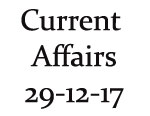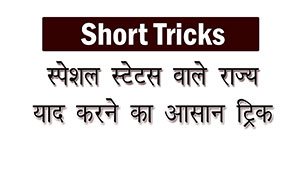-
Current Affairs 29th December 2017
Updated : 29-Dec-2017
Current Affairs 29th December 2017 - Important Points
- Israel passed controversial law limiting police powers on - 28th December 2017
- Lok Sabha passes bill criminalising Instant Triple Talaq on - 28th December 2017
- Prithvi supersonic interceptor missile successfully test fired in - Odisha
- First photovoltaic highway successfully tested by - China
- Sumita Misra appointed as joint secretary in PM’s Economic Advisory Council on - 29th Decemeber 2017
Current Affairs 29th December 2017 - Details
Israel passed controversial law limiting police powers on - 28th December 2017
The Parliament of Israel approved a controversial law on 28th December 2017, limiting the police's capability to recommend charges after their investigations after opposition that lawmakers were looking forward to protect Prime Minister Benjamin Netanyahu.
The law will, however, not applicable to present investigations, which means that graft probes involving
Netanyahu will not be affected. The movement was undertaken after increased criticism and mega protests against corruption.
Key Highlights- The Members of the parliament passed the bill by a close vote of 59-54, which took place on 27th December following 2 days of marathon debate.
- In this law, the police will not be capable to send to the attorney general whether or not to charge suspects at the conclusion of an enquiry.
- The changes in the legislation were took in by Israeli Prime Minister Netanyahu in the starting of December 2017 post criticism by opposition that the law was designed to help the leader saved in the ongoing corruption investigations against him.
- His call came after many people protested against corruption.
Lok Sabha passes bill criminalising Instant Triple Talaq on - 28th December 2017
Lok Sabha on 28th December 2017 approved the Muslim Women- Protection of Rights on Marriage, Bill, 2017. The Bill bans the practice of immediate triple talaq among Muslim community.
The bill was presented by Union Law Minister Ravi Shankar Prasad in the lower house on 28th December 2017 in the wake of the August 2017 decision of Supreme Court announcing immediate triple talaq practice as null and void, non-constitutional and arbitrary. Provisions of the Muslim Women (Protection of Rights on Marriage) Bill, 2017. The bill was made by an inter-ministerial community headed by Union Home Minister Rajnath Singh.Important Highlights
- It confirmed immediate triple talaq or talaq-e- biddat illegal and void, be it in any form including spoken, in-writing or by electronic ways such as email, SMS and WhatsApp or in any other whatsoever meaning.
- It explains talaq as talaq-e- biddat marked by a Muslim man resulting in immediate and irrevocable divorce. Talaq-e- biddat refers to the act under Muslim personal laws where markig of the word ‘talaq’ thrice in single sitting by a Muslim man to his wife causes an immediate and irrevocable divorce.
- It makes announcement of talaq a cognizable and non-bailable crime. A husband announcing talaq can be imprisoned for up to 3 years along with a cash fine.
- Any crime committed under the Code of Criminal Procedure, 1973 will be taken as cognizable and non-bailable. It predicts entitling divorcee Muslim women for maintenance amount.
- It gives potential to wife, upon whom talaq is decided, to approach a magistrate looking forward subsistence maintenance amount for herself and her children.
- Married Muslim woman will be authorized to custody her minor children in the event of pronouncement of talaq by her husband, which will be decided by the Magistrate.
Supreme Court's ruling on Triple Talaq
- The Bill was formed after the Supreme Court’s verdict on 22nd August 2017, which found the Islamic practice of immediate ’ triple talaq as unconstitutional.
- The verdict was given by a five-judge bench led by the then Chief Justice J S Kehar.
- All the five judges belonged to five various religions.
- The court also found that the practice of immediate triple talaq was voilation of Article 14 and Article 21 of the Indian Constitution. It also goes antagonist to Shariat and the main tenets of the Quran.
Prithvi supersonic interceptor missile successfully test fired in - Odisha
Made in India Prithvi Advanced Air Defence supersonic interceptor missile was successfully test and
fired from a test area in Odisha. It is effective in destroying any coming ballistic missile in low height.
Important Highlights- The target missile Prithvi interceptor AAD missile was fired from launch complex 3 of Integrated Test
- Range at Chandipur in Odisha. After receiving signals by locating radars, the missile controlled its
trajectory to demolish hostile target missile in mid-air in an endo-atmospheric height. - The Prithvi interceptor is a 7.5-meter long, single-stage solid rocket propelled directed missile. It is
loaded with a navigation system, a fully loaded computer and electro-mechanical activator. - It can demolish the incoming hostile ballistic missile in endo-atmospheric area at a low height of less than 30 kilometres. The missile has its own mobile data link for interception, launcher, independent tracking and homing capabilities and sophisticated radars.
- This was the 3rd supersonic interceptor test of missile done this year in which an incoming ballistic missile target was successfully tested, within 30 km altitude of the earth’s atmosphere. The past 2 tests were organized on February 11th and March 1st 2017.
First photovoltaic highway successfully tested by - China
China has successfully trailed the roads with solar panels with the existence of built-in wireless charging
systems for electronic vehicles and other sensors for drones. The photovoltaic pathway is something of next level which includes technologies into pathway for producing solar power, for lighting, improving the working of autonomous cars, and for observing the condition of the roads. China attained this feat of having 1st photovoltaic pathway based on home-grown scientific knowledge, in the nation's eastern Shandong province.
China’s photovoltaic highway- The photovoltaic pathway is constructed using solar panels which have a firm sheet of clear concrete on top of them, safeguarding the surface.
- The solar panels were outlined and build to shift power to electric vehicles passing on top of them.
- The 1 kilometre portion of photovoltaic pathway covers up a surface area of 5,875 square meters.
- The exceptional section has three-layers. The top is protective, build of transparent concrete, and its lower layer is an insulator to evade moisture from passing to the photovoltaic gadget in the middle layer.
- The trail 1 kilometre segment of pathway can generate 817.2 KW of energy and is likely to produce one million KW hours of power per year.
- The power generated by this pathway will be joined to China's national power grid.
Photovoltaic pathway France was the 1st nation to inaugurate the world's 1st photovoltaic pathway integrated with solar panels in 2016. After France, China becomes the 2nd nation to construct a photovoltaic pathway.
Sumita Misra appointed as joint secretary in PM’s Economic Advisory Council on - 29th Decemeber 2017
IAS officer Sumita Misra was nominated joint secretary in Prime Minister’s Economic Advisory Council for 5 years on 29th December 2017. She is a 1990 batch IAS officer of Haryana cadre.
Prime Minister’s Economic Advisory Council- PMEAC is a non-constitutional and non-statutory, non-permanent and self-governing body, formed with the main and sole objective to analyse all critical matters, economic, or passed to it by the prime minister and guiding him thereon.
- It is compulsory to guide prime minister on economic issues such as inflation, GDP alteration, export-import alterations, forming supporting environment for increased trade and
commerce.
Present Composition of PMEAC - Bibek Debroy, NITI Aayog associate is the chairman of the Council. Its 4 associates are Ratan Watal, NITI Aayog’s prime advisor and former Finance Secretary, Rathin Roy, Economist Surjit Bhalla, Director of National Institute of Public Finance and Policy and Professor Ashima Goya, Indira Gandhi Institute of Development Research.
Job profile of PMEAC - Present periodic reports to PM in concerned to macroeconomic progress and matters which will have implications of the financial policy.
- Analyse any matters, issues allocated by the PM and give advice to them. Study macroeconomic matters having most importance and submit the views to PM and any other work which is allocated by Prime Minister.














